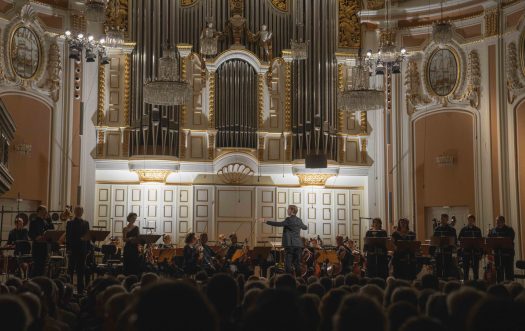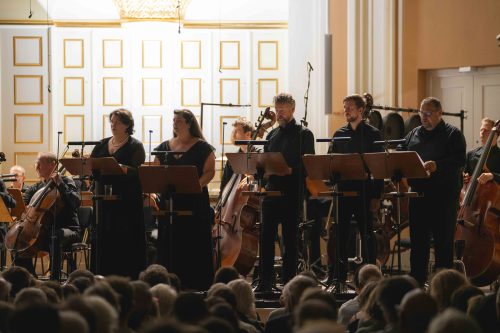 Austria Salzburg Competition [1] – Haas, Koma: Soloists, Klangforum Wien, Bas Wiegers (conductor). Grosser Saal, Mozarteum, Salzburg, 24.7.2024. (MB)
Austria Salzburg Competition [1] – Haas, Koma: Soloists, Klangforum Wien, Bas Wiegers (conductor). Grosser Saal, Mozarteum, Salzburg, 24.7.2024. (MB)

Forged:
Michaela – Sarah Aristidou
Jasmin – Pia Davila
Alexander / Mom – Daniel Gloger
Michael – Peter Schöne
Dr Auer – Susanne Gritschneder
Dr Schönbühl – Henriette Gödde
Nurse Jonas – Karl Huml
Nurse Nikos – Benjamin Chamandy
Nurse Zdravko – Raphael Sigling
One among Alexander Pereira’s most profitable improvements on the Salzburg Competition was the introduction of an ‘Ouverture Spirituelle’ at its starting. Pereira’s observe, lengthy since discarded, was to open that opening, because it had been, with a efficiency of Haydn’s Creation; if reminiscence serves me accurately, I recall him saying that he was a descendant of an unique subscriber. (I attended ten years in the past, lucky to listen to Bernard Haitink because the conductor, click on right here) On first look, the concept of a smaller, associated pageant of sacred music, utilising Salzburg’s array of church buildings, would possibly by now appear to have been stretched to or past breaking level right into a imprecise number of ‘spiritually’ inclined works. What music, the sceptic would possibly ask, shouldn’t be in some sense ‘non secular’? There may be, I believe, some power to that objection. Nevertheless, if one appears to be like to the extra particular theme or motto this yr adopted by Markus Hinterhäuser, ‘Et expecto’, there’s maybe the same drawing of order, if not out of chaos, then out of its perceived hazard.
It actually helps us to grasp the inclusion of a live performance efficiency of Georg Friedrich Haas’s one-act, two-hour-long opera, Koma, involved, as its title suggests, with the liminal expertise of a affected person, probably following a suicide try, in a coma, gaining and shedding consciousness. The opera is instructed and, I believe, skilled from the standpoint of Michaela, the excellent Sarah Aristidou, positioned fairly individually from the remainder of the solid: tellingly, unseen to us (no less than to me and I assume to everybody else), by some means each inverting and but strengthening the concept of an out-of-body expertise. However probably the most putting factor, no less than initially so, each of labor and efficiency, is that a lot of it – about half – takes place at midnight. Music in ‘full’ darkness has lengthy been a Haas preoccupation. Twenty minutes of in useless, one of many final nice musical works of the 20 th century happen in darkness; so does the whole lot of the composer’s Third String Quartet.

In our world, darkness is never if ever ‘full’. Right here, within the Mozarteum’s Grosser Saal, there have been a couple of indicators of sunshine, as soon as one’s eyes adjusted, and never solely from glimpses of fluorescent watches that should now be in vogue. (Recurrent sight of 1 would show aggravating in one other pageant efficiency, during which lights had been solely dimmed. Are these the brand new cell telephones?) One’s sight, like different senses, can play methods too, which I believe comes nearer to the purpose or to one in all them. The principal level, nonetheless, stays darkness: what and the way one experiences issues in it, and its transition to different states, be they gentle, one thing extra crepuscular, or demise.
This, the second in a collection of three chamber operas Haas wrote with Händl Klaus for Schwetzingen – to his delight, he discovered the previous theatre extremely acceptable for darkness – naturally additionally explores, and raises questions, regarding how music is perhaps made in such circumstances, and others. Haas acknowledges it should be a ‘nightmare’ for the conductor, having to attend for the sunshine as soon as once more to return to do his factor, having to select up from the place the musicians have introduced him. But, as with many features of this work, one would possibly say that such helplessness is just a heightened expertise of what’s already the case. In spite of everything, the conductor virtually by no means makes music instantly in any respect; he’s each omnipotent and fully within the musicians’ energy. I take advantage of ‘he’ right here, just because it’s the acceptable pronoun for Bas Wiegers, whose accomplishment in main the musicians of Klangforum Wien was each bit as exceptional, in a great way, as theirs — and the singers’. Docs, nurses, members of Michaela’s household, with reminiscences they wished and most actually didn’t want, to dredge up or have dredged up, got here and went, reworked: fascinatingly, within the case of her brother-in-law Alexander metamorphosing right into a countertenor Mom, given an often-visceral efficiency from Daniel Gloger.
That appeared to be virtually a visible counterpart or instantiation (Wagner’s ‘deeds of music made seen’ even) of Haas’s musical language and technique. Clearly, one can not write music for the darkness simply as one would possibly for the sunshine, however that’s in all probability not as such the purpose, or no less than my level. The post-spectralist areas opened up, inhabited, and prolonged by what we could consider as microtonality however Haas, not unreasonably, prefers to contemplate as music past the twelve notes of the chromatic scale sounded as a vital realm for this drama of states, transitions, reminiscences, and extra. I used to be put in thoughts additionally of Schoenberg’s Erwartung, during which a second in notion is stretched out to thirty minutes and skilled as such. There is no such thing as a suggestion that that is happening right here in any literal sense, however such heightened states maybe maintain one thing in widespread. Finally, although, this was a singular, but very human expertise, whose lack of staging for Haas proved a bonus relatively than a compromise. We could or could not agree; in all such circumstances, there’s acquire and loss. However then such is life. Such are also demise and, probably, a bunch of states in between.
Mark Berry


